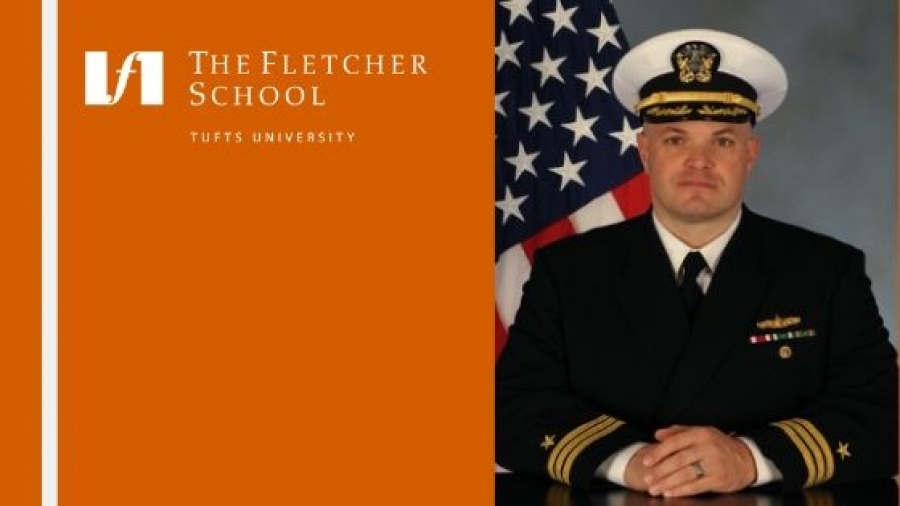[Graduated May 2021]
I am JD Kristenson, a surface warfare officer in the United States Navy. Most of my career has been serving in ships in the Navy. Ashore, I studied for a Masters in International Development in Tsinghua University (Beijing, China) as an Olmsted Scholar and am currently a Special Assistant for the Supreme Allied Commander of NATO in Belgium.
What drew you to the Global Business Administration program?
Top-tier academic programs have largely been slow to move into online education, and it is especially difficult to find a globally-mediated program with the tremendous academic reputation of Tufts. Fletcher has demonstrated that they are committed to delivering the same—or better—educational experience to that of students on campus.
Thus far, what has been a particularly rewarding experience in your professional career?
I had the privilege of commanding a coastal minesweeping vessel, USS CHAMPION (MCM 4). During my time in command of CHAMPION, I was wholly and inescapably responsible for everything that happened or failed to happen on my ship and with my crew. I loved the crew, the mission, and the total accountability of being a ship Captain. During my time in command, CHAMPION distinguished herself as the most-awarded ship in the Navy of any class. I remain deeply proud of what we accomplished as a team.
What skills are you looking to develop during your time at Fletcher?
I have spent much of my career refining my instincts and intuition, but I am looking to increase the analytical rigor of my decision making. One needs to make the right choice, but in order to sustain success, one also needs to be able to communicate the reasons for those decisions up, down, and laterally within the organization. Being able to employ powerful and proven models is helpful to communicate the reason behind decisions and, crucially, help expose any potentially dangerous errors in critical thinking.
Can you recall a class discussion that really changed your mind on a topic?
Yes—the concept of inequality in Dr. Drezner’s course. As the recipient of all sorts of privilege (white, male, American, and otherwise) I had completely missed the point of why persistent inequality can be so noxious. It is not really that people’s starting points are different that is crucial. Nor is the fact that the outcome of any game results in “winners” and “losers.” Such is life. It is when the winner of each round gets to rewrite the rules for the next round that inequality shifts from relatively benign variance to a truly pernicious malignancy. This really opened my eyes to what it means to when an unfair playing field develops over generations.
Seeing as the program is mostly online, do you have any advice on how to best foster relationships and increase collaboration with fellow students and faculty?
Yes. Make a point to participate in the optional, student-led study groups. Resist the temptation to self-organize into the same study groups from class to class. If you worked well with someone last semester, you likely already have a Fletcher friend for life. Seek out classmates that you have not yet organically coming into close contact with and you will both be better for it. Making the effort to help the class(es) that come behind you will effectively double or triple your professional network. Your friend from the next cohort may not have the answer you are looking for, but there is a good chance they someone who they know in their class will.
What is your biggest passion?
I have lived and visited spectacular places on every settled continent. I have hiked the Great Wall of China, rode a camel at the Pyramids of Giza, climbed Mount Kilimanjaro, and bowed my head at the great churches of Europe –my ‘bucket list’ is pretty short. But the greatest honor of my professional life is to lead Sailors at sea, to be measured against the highest ideals of command at sea; there is nothing like it.
What was one of your favorite international experiences?
I took a djembe lesson on the beaches of Zanzibar (in Swahili). Music, travel, the ocean, foreign language—that one hour probably had more of the things that I enjoy packed into it than any other experience I can remember.
It’s 8:00 PM on a Sunday evening. How do you spend the remaining hours of the weekend?
What hours left? 8:00 PM on a Sunday–I am already thinking, “how soon can I go to be and have a reasonable chance of sleeping all the way through until I get up at 5:00 AM on Monday?”
You must start each day (for the rest of your life!) listening to the same song. Which song do you choose and why?
“Simple Man” by Lynyrd Skynyrd (Shinedown version)
This is the song that inspired me to learn the ukulele and guitar. Great instrumental arrangement, but absolutely brilliant lyrical performance. There is so much wisdom and feeling in this song that I literally never get tired of hearing it and probably never will.


